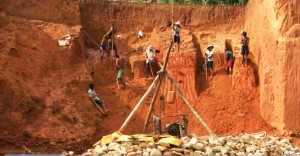Saw Albert, the field director of the Karen Human Rights Group, in an exclusive interview with Karen News, said that since Burma’s 2010 election, changes in the government’s administration has allowed a lot of business and development projects to come into the country that are stealing land from ethnic villagers’.
 “Many people think that Burma has opened up and the situation has improved. When we hear the word ‘development’, it sounds positive and beneficial, but it is not the case. The way development projects are being implemented in our areas, they are not beneficial to our local communities or villagers.”
“Many people think that Burma has opened up and the situation has improved. When we hear the word ‘development’, it sounds positive and beneficial, but it is not the case. The way development projects are being implemented in our areas, they are not beneficial to our local communities or villagers.”
Saw Albert says that “as more investments and economic developments come in, local villagers are losing their land to hydro-power dam projects, special economic zones (SEZ’s) or to other construction projects.”
Saw Albert points out that the 2012 cease-fire agreements reached between the government and “ethnic armed groups, including the KNU [Karen National Union]…is a positive change as it is a relief for local villagers to be able to live more peacefully since there is little fighting.”
Saw Albert says that despite the ‘positives’ from the ceasefire agreements villagers are still being abused and their lands stolen.
“Previously, we’ve seen that most cases of land confiscation took place when the Burma Army took villagers’ land to build military camps or to use it for military purposes. After the ceasefire agreement land confiscation is now because of business or development projects.”
Saw Albert explains that KHRG field research has found that if “human right violations are compared before the ceasefire and after the ceasefire periods, we find that human right violations on local communities are still the same. In the past, villagers were displaced due to fighting – now villagers lose their farmlands or have their villages destroyed by flooding from construction or dams [projects].”
Saw Albert says KHRG field researchers documented testimonies from “some villagers who told us that in the past, during armed conflict they could at times sneak back to [collect products] from their betel nut or durian plantations, but now all their plantations and houses are under water and they can’t get anything. The impacts are still as serious now as the human right violations were during [periods] of armed conflict.”
Saw Albert claims that, “most of the land-grabbing incidents taking place now are being done with the involvement of people in authority. I mean government officials who have granted permission and allow [development] activities to be carried out.”
Saw Albert explains that many groups with ‘authority’ are involved in ‘profiting’ by taking land from villagers.
“Other groups such as local government or ethnic armed groups are also involved in land grabbing. This includes authorities from within the KNU in Karen areas although the level of involvement varies between direct or indirect.”
Saw Albert says it is not easy for developers to just turn up and start construction or rip out trees without ‘official permission’ from a wide range of local authorities.
“For example, those who come into Karen areas to do business or development projects can’t just come in and do it with official government permission. They also have to get permission from local authorities. In Karen State, authorities are not just the government and the KNU, there are also other [armed militia] groups such as the Border Guard Force and DKBA -business people also need to get their permission.”



